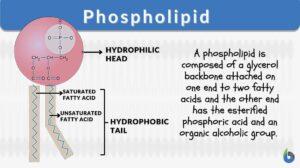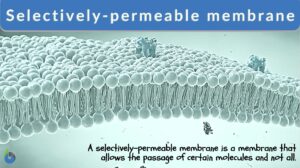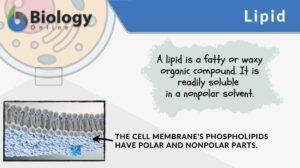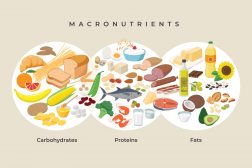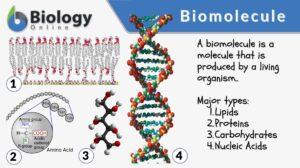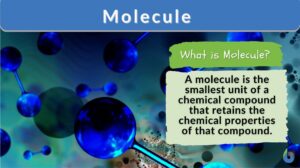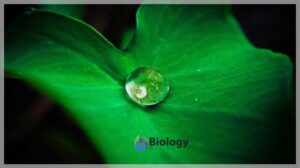Search Results for: phospholipid
Phospholipid
What is a phospholipid? Phospholipids are a subgroup of lipids. Other major types of lipids are fatty acids, sphingolipids,... Read More
Amphipathic
Amphipathic Definition Amphipathic is a word used to describe a chemical compound containing both polar (water-soluble) and... Read More
Phospholipid bilayer
Definition noun The two layers of phospholipids arranged in such a way that their hydrophobic tails are projecting inwards... Read More
Plasma membrane
Do all cells have a plasma (or cell) membrane? Yes, all cells have a biological membrane that separates the protoplasm from... Read More
Cell membrane
Cell Membrane Definition Just like any non-living body possesses a plastic or paper packaging material that keeps the... Read More
Selectively-permeable membrane
Selectively Permeable Membrane Definition We can define selectively permeable membranes as those that are selectively... Read More
Endoplasmic reticulum
Endoplasmic Reticulum Definition The endoplasmic reticulum is a membrane-bound organelle in cells of eukaryotic cells... Read More
Fluid mosaic model
Fluid Mosaic Model Definition What is the fluid mosaic model? The fluid mosaic model is a three-dimensional representation... Read More
A Balanced Diet – Carbohydrates and Fat
Alongside the numerous vitamins that are required as part of a healthy diet, we must also eat food containing a variety of... Read More
Biomolecule
A molecule is an electrically neutral, group of atoms that can exist alone in a free state while its characteristic... Read More
Biological Cell Introduction
It only takes one biological cell to create an organism. In fact, there are countless species of single-celled organisms,... Read More
Phosphate group
Definition noun, plural: phosphate groups (biochemistry) A functional group or radical comprised of phosphorus attached to... Read More
Hydrophobic
Hydrophobic Definition The fear of mixing or reacting with water under a given set of reaction parameters is often referred... Read More
Glycolipid
Definition noun, plural: glycolipids A carbohydrate, usually an oligosaccharide, that is covalently linked to a lipid... Read More
Integral protein
Definition noun, plural: integral proteins A protein molecule or protein assembly permanently attached in biological... Read More
High-density lipoprotein cholesterol
Definition noun High-density lipoprotein carrying a cholesterol molecule at its center Supplement A lipoprotein is an... Read More
Endomembrane system
Ever wondered how biomolecules are made within the cell and then they are released outside the cell for use by the body?... Read More
Selective permeability
Definition noun A feature and a function of the plasma membrane that is essential to maintain homeostasis by regulating the... Read More
Glycerolipid
Definition noun, plural: glycerolipids A type of lipid made up of a glycerol linked esterically to a fatty acid Supplement A... Read More
Sphingolipid
Definition noun plural: sphingolipids sphin·go·lip·id A type of lipid with a sphingoid base (e.g. sphingosine and... Read More
Chemical Composition of the Body
In order to fully understand the mechanisms of human physiology, it is important to have an understanding of the chemical... Read More
Cell Structure
The interior of human cells is divided into the nucleus and the cytoplasm. The nucleus is a spherical or oval-shaped... Read More
Basolateral plasma membrane
Basolateral plasma membrane (Science: cell biology) The plasma membrane of epithelial cells that is adjacent to the basal... Read More
Mitochondrion
Mitochondrion Definition What are mitochondria? The term “mitochondrion” comes from the two words of the Greek... Read More
Extrinsic protein
Definition noun, plural: extrinsic proteins A membrane protein that partially span the membrane, and is attached either to... Read More
Integral membrane protein
Definition noun A protein molecule (or assembly of proteins) that is permanently attached or firmly anchored in the plasma... Read More
Palmitic acid
Definition noun, plural: palmitic acids A 16-carbon fatty acid, with the formula: CH3 (CH2)14 COOH Supplement A fatty acid... Read More
Prothrombin
Definition noun A blood clotting factor that when activated converts into thrombin (factor IIa), which in turn activates... Read More
Amniotic fluid
Definition noun The protective fluid surrounding the developing fetus within the amniotic sac of a pregnant... Read More
